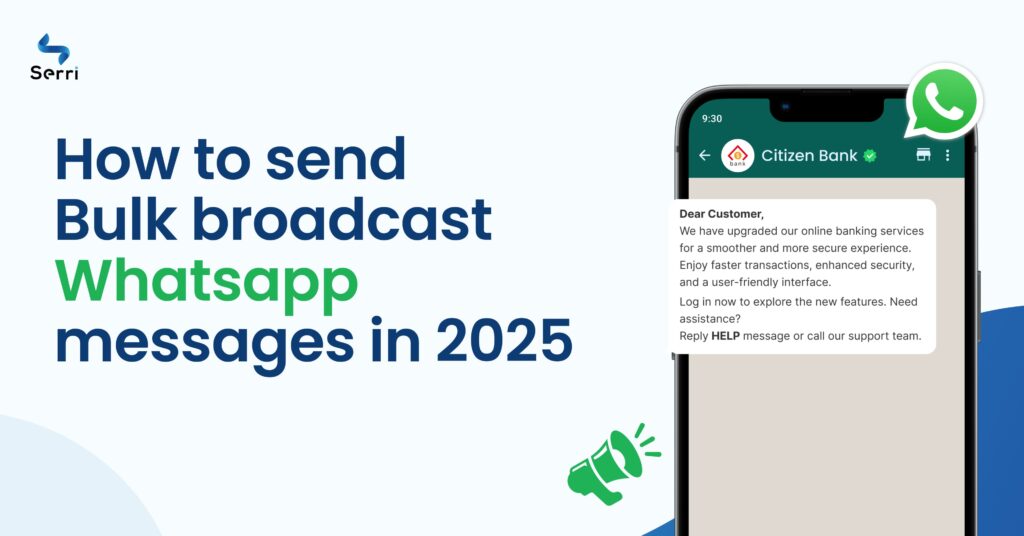
Bulk broadcasting is now a go-to strategy for businesses aiming to connect with a large audience quickly and easily. WhatsApp is one of the best platforms for this in 2025.
First, you must ensure you’re using the right tools. WhatsApp Business API is designed for this purpose, allowing you to send messages to thousands of people simultaneously.
What is the difference between a broadcast and a group message?
Broadcast Message
One-way communication
Sent individually to multiple contacts at once
Recipients don’t see each other
Only works if the recipient has your number saved
Ideal for: announcements, offers, updates (like from a business)
Group Message
Two-way communication
Everyone in the group can see all messages
Members can reply and see who else is in the group
Ideal for: collaboration, discussions, family/friends chat
Benefits of Using Bulk Broadcasting
1. Wide Reach:
With over 2 billion users worldwide, WhatsApp offers businesses a vast audience to connect with.
2 . High Engagement Rates:
WhatsApp messages usually have higher open and response rates compared to emails or SMS, making sure your communication gets noticed.
3. Cost efficiency:
Bulk messaging on WhatsApp is cheaper than traditional SMS, especially for international audiences, making it a cost-effective marketing strategy.
4. Personalization:
You can customize the messages, which improves customer experience, builds value, and increases the chances of engagement and conversion.
How to Prepare for Bulk Broadcasting
Set Clear Objectives:
Before you begin, decide what you want to achieve with your broadcast. Are you promoting a product, sharing important updates, or providing customer support? Make this clear.
Build a Quality Contact List:
Make sure your contact list is made up of users who have opted in to receive messages from you. This boosts engagement and lowers the risk of being marked as spam.
Here’s how to send bulk WhatsApp messages in Serri: step-by-step
1. Import contacts
Begin by importing your contacts into the Serri dashboard. Group your contacts based on factors like interests, location, or purchase history. This way, you can send targeted and personalized messages to each group, increasing engagement.
2. Broadcast
Now, select the contacts to which you want to send bulk messages and click on Broadcast.
3. Write Your Message
Choose a campaign name and craft a compelling message that resonates with your audience. Keep it short, clear, and relevant to your target group.
Alternatively, you can use pre-designed message templates that align with your campaign’s goals and brand voice.
4. Schedule the campaign or send it directly
At last, click on schedule to schedule the campaign, and choose the best date and time for your campaign to ensure it has the greatest impact.
Or else you can click on Send Now to directly send messages to your customers right now.
Best Practices for Bulk WhatsApp Messaging
1. Timing Your Messages:
Send messages when your audience is most active. Think about time zones and when people usually use WhatsApp.
2. Frequency of Broadcasts:
Keep your audience informed, schedule them, and avoid sending too many messages.
3. Utilizing Rich Media Wisely
Use images, videos, and other media to make your messages better, but make sure they’re relevant and add value.
4. Using Clear and Compelling CTAs:
Every message should include a clear and compelling call to action (CTA). Whether you want people to visit your website, sign up for a service, or reply for more info, make sure the CTA is straightforward to follow.
5. Personalizing Messages:
Include the recipient’s name and personal details to make messages more engaging and make them feel valued.
Tips for Effective Bulk WhatsApp Messaging
Follow these best practices to maximize the success of your bulk messaging campaigns:
1. Segment Your Customers:
Grouping your customers based on demographics, interests, or preferences is essential for effective bulk messaging.
This targeted approach ensures your messages resonate with the right audience, enhancing engagement and increasing the chances of achieving your desired outcomes.
2. Keep Messages Short and Sweet:
When making bulk WhatsApp messages, keep them short and clear. This helps your main ideas come across quickly and prevents overwhelming your audience. Short messages catch attention and show respect for your recipients’ time.
3. Test Before Sending:
Always test your messages before sending them in bulk. Testing helps you check for correct formatting and content, avoiding embarrassing mistakes or miscommunications. This step ensures your messages look professional and convey your intended message.
4. Review and Improve:
Once your campaign is live, it’s crucial to review its performance. Check key metrics like delivery rates, open rates, and click-through rates to gauge its success. Use this data to identify areas for improvement and enhance your future messages.
Here’s how Serri helps businesses in bulk Whatsapp messaging
With Serri, businesses can easily send WhatsApp messages to thousands of contacts simultaneously, craft personalized messages, and Access detailed analytics to monitor the performance of their messages.
Serri is an official Meta tech partner that provides WhatsApp marketing services to businesses.
Here’s what clients say about Serri
Conclusion
Bulk broadcasting on WhatsApp in 2025 is an effective way to reach your customers. By understanding how the platform works, preparing properly, and following some simple tips and best practices, you can achieve great results.
FAQs
How can I send bulk messages on WhatsApp without being banned?
Make sure your contacts have opted in, avoid sending spam, and stick to WhatsApp’s rules.
What is the difference between WhatsApp Broadcast and Group messages?
Broadcast messages are one-way communications where recipients can’t see each other. In contrast, group messages let everyone interact with one another.
Can I personalize bulk messages on WhatsApp?
Yes, you can personalize messages with names and relevant details to increase engagement.
What tools can I use for WhatsApp bulk messaging?
You can use the WhatsApp Business API or third-party tools specifically made for bulk messaging.